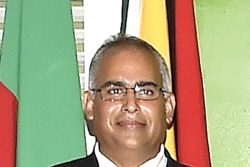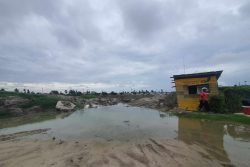The war in Ukraine has opened up a channel of communication between the US and Venezuela “that may lead to Maduro drinking less vodka and exporting more oil,” commented the Caracas Chronicles last week. US officials had met President Maduro and Vice-President Delcy Rodríguez in Miraflores at the weekend after a hiatus in official contacts which had lasted three years. The motivations of the two sides in setting up this encounter were no secret: Caracas wants relief from sanctions and Washington is casting around for possible sources of oil.
Although the US imports relatively little Russian oil which it has now banned, like the rest of the West it is still affected by substantial increases in the price of petrol at the pump. As of last week the price of crude had reached $130 a barrel in the US, the highest it has been since 2008. In circumstances where midterm elections are due this year, the Biden administration now finds itself under considerable political pressure.
It was only on March 2 that Presidents Vladimir Putin and Maduro had spoken on the phone about increasing their “strategic partnership”, while where the war in Ukraine was concerned, the Venezuelan head of state had not hesitated to express his support for Russia. Last month Reuters reported Colombian Defence Minister Diego Molano as claiming that Venezuela was moving troops to their common border with technical assistance from Russia and Iran. The border on both sides is problematic since it is a centre of drug trafficking and criminal activity of various kinds, with armed factions of former Colombian guerrillas fighting to control the narcotics trade in particular.
Colombia had raised its concerns about Caracas being the beneficiary of Russian military equipment with the Russian Ambassador in Bogotá; however, Reuters had reported that Russia had promised that any military equipment would not be used to attack Colombia, destabilise Latin America or find its way into the hands of illegal armed groups. No one is in any doubt given what has happened in Ukraine that Russia’s promises are meaningless, but whatever Mos-cow’s designs in February, it will be unlikely to carry through with them now. Bogged down in Ukraine as it is, it will simply be unable to supply weaponry or spare military assistance on any scale to Venezuela, particularly given the distance that country is from Russia.
That said, the Kremlin is unlikely to be happy that Nato is creeping indirectly onto this continent, now that on Thursday the White House said it intended to designate Colombia as a major non-Nato ally. According to the State Department this would provide Colombia with certain defence, trade and security co-operation privileges, in concert with more than a dozen other countries in the same category. That reinforces the possibility as suggested by Geopolitical Futures earlier last month that at some point further down the line Moscow will still seek to pursue a proxy war on the Colombian-Venezuelan border with the aim of destabilising Colombia.
As far as Venezuela is concerned, it might be noted that despite President Maduro’s public declaration of support for Russia on Ukraine, it still did not vote against the motion in the UN General Assembly condemning the invasion; it abstained. Whether at that stage Caracas was hoping for a rapprochement with the US is simply not known, but significantly, according to Reuters, the meeting with the US officials was requested by the Maduro government through the multinational law firm Dentons. The report said the Venezuelan “financial lifeline to Russia [was] fraying under sanctions on Moscow”, and that Caracas had requested that Russia unfreeze oil proceeds held in certain Russian banks which had been sanctioned by the US. Some relief from Ameri-can sanctions was presumably regarded as even more pressing than usual for Miraflores.
Not too much detail emerged about the US-Venezuelan meeting, although according to Reuters a Washington source said that American officials saw a chance to gauge whether Caracas was prepared to distance itself from Vladimir Putin, in addition to identifying alternative sources of oil. Washington, it was reported, looked for guarantees of free presidential elections, reforms of the oil industry and the public condemnation of the Ukraine invasion, although it was prepared to consider temporarily allowing Venezuela to use SWIFT. For his part President Maduro called the talks “friendly and respectful”, adding that “the Venezuelan and the American flags looked good together.”
His objectives were the lifting of sanctions, both on oil exports and individuals, and the return of Pdvsa’s Citgo subsidiary. Two sources told the agency that never mind if there was no agreement with Washington, Miraflores could still use the meeting to pressurise Russia into ensuring that Venezuelan money still flowed.
The US had also asked for the release of its nationals detained in Venezuela, and subsequent to the meeting two of them were released in what was described by the Venezuelan head of state as a “sign of good faith.” He did not secure the release of the Colombian Alex Saab in return, however, a man who had been intimately involved with the Venezuelan government in corrupt deals and was being held in the US on money-laundering charges. The impasse over his release had been a major cause of the collapse in the last talks between the government and the opposition in Mexico City, and Caracas had previously made him a condition of a return to negotiations.
The US had bypassed Mr Juan Guaidó in relation to the Miraflores meeting; however, it did insist in the course of it on a return to negotiations between government and opposition. Maduro appeared to be amenable to this request, subsequently announcing that the talks in Mexico City would resume. It might be noted that the only agreement to emerge from the discussions between the two sides last year was that both recognised the legitimacy of their claim to our Essequibo. Aside from its utterly outrageous nature, is not something which should be a part of any talks on a return to democracy. Both Russia and the United States were observers at the time.
Capitol Hill was a good deal less than enthusiastic about the encounter with President Maduro, Chair-man of the Senate Foreign Relations Committee Robert Menendez expressing the view that no deal should be done with Caracas. He described Mr Maduro as “a cancer to our hemisphere and we should not breathe new life into his reign of torture and murder”. As it is the US has agreed to meet again, although no date has been set.
It perhaps might be added that not all experts are convinced that even if some deal were done with Washington, Venezuela could increase its oil production. One of them, Mr Francisco Monaldi is of the view that problems such as an unreliable electricity supply, industrial accidents where no compensation was paid, a shortage of workers and a US$15 billion a year investment made it a “highly ambitious goal”. In contrast to that glum prediction there is the possibility that US transnationals like Chevron could play a role in improving production.
After the talks with the US, Vice-President Rodríguez was off to Turkey where she met with Russian Foreign Minister Sergei Lavrov. Exactly what came out of that has not been reported, but prior to the rendezvous she was quoted as saying, “You’ll never see us on the side of war”, and calling for peace between Ukraine and Russia.
It was Mr Eric Farnsworth of the Council of the Americas who summed up all the comings and goings in a down-to-earth way: “Yes, Maduro is anxious for sanctions relief. No, he is not interested in shifting alliances. This is tactical … [The] U.S. must be clear-eyed about this, not naive.”
And what about Guyana in all of this? One imagines that Russia’s invasion of Ukraine would now make it very difficult for Venezuela to indulge in any kind of extreme adventurism in relation to Essequibo. However, we have to maintain our guard because there are all kinds of scenarios short of the ultimate one which could present us with intractable problems, particularly on a stretch of border like the Cuyuni, where our control is a lot more tenuous than it should be.
We will now be perceived by Moscow as being in the US camp, and while Caracas may theoretically come to a détente with Washington, as Mr Farnsworth says it will probably be only of a temporary nature. Even the advent of a democratic government next door will make no difference to us, although such an administration may be more susceptible to American pressure than the present one. Prior to the current invasion, Russia had demonstrated all kinds of ways in which it could undermine the sovereignty of other nations, as not just Ukraine, but also Georgia and Moldova can attest.
Now is not the time to fall into complacency, even in the expected eventuality of a favourable decision from The Hague; Venezuela as is clear will reject it. We need to keep up our contingency planning.






